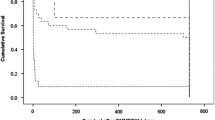Summary
The ultimate goal of intensive care is to bridge critical failure of vital functions in order to achieve an acceptable perspective for further life for as many patients as possible and hence in a cost-effective way. Decisions should be based on valid data on patient outcome. These data are often lacking or are not applicable to an individual patient. The specific developmental medical and social needs and the special legal position of children and their parents or caregivers are explicit topics in pediatric intensive care. This article focuses on the difficult decision process when multiple handicapped children are proposed for admission to the intensive care unit. Decisions as to life support in these children need to be made in advance before the vital functions fail. The decision not to (re)admit a child to the intensive care unit does not imply disregarding other modes of curative care. Do-not-resuscitate orders should be specified and preferably be replaced by individually defined comfort care policies. Withdrawing treatment does not mean withdrawing care.
Samenvatting
Het doel van intensive care is om een periode met insufficiënte vitale functies te overbruggen, om in de daarmee verkregen tijd de patiënt te laten herstellen tot een voor hem of haar acceptabel niveau. De daartoe beschikbare technologie dient kosteneffectief te worden ingezet. Besluiten dienen op grond van valide gegevens over behandelingsresultaten genomen te worden. Deze gegevens ontbreken echter vaak of zijn niet van toepassing op een individuele patiënt. Daarnaast vereist de bijzondere sociale en juridische positie van kinderen en hun ouders of verzorgers binnen de kinder-ic specifieke aandacht. Dit artikel gaat over de problemen waarvoor de kinderarts-intensivist zich geplaatst ziet bij de besluitvorming over opname van ernstig multipel gehandicapte kinderen. Deze besluitvorming dient niet uitgesteld te worden tot de vitale functies van het kind manifest tekortschieten. In een vroege fase dienen kinderarts en andere relevante disciplines in overleg met de kinderarts-intensivist een voor kind en ouders aanvaardbaar beleid in dezen vast te stellen. Als afgesproken wordt het kind niet (meer) op de intensive care-afdeling op te nemen, betekent dit niet dat in het geheel geen curatieve behandeling meer wordt ingesteld. Niet-reanimeer opdrachten zijn als zodanig te weinig specifiek en dienen vervangen te worden door een goed omschreven behandel- en verzorgingsplan.
Similar content being viewed by others
Literatuur
Vught AJ van. Intensive care bij kinderen: een brug naar herstel. Ned Tijdschr Intensive Care 2001;16:47-56.
Bams JL, Miranda DR. Outcome and costs of intensive care. A follow-up study on 238 ICU-patients. Intensive Care Med 1985;11:234-41.
Visser J. Zorgen om IC-capaciteit. Medisch Contact 2001; 56:1524-6.
Bakker J, Damen J, Zanten ARH van, Hubben JH. Criteria voor opname en ontslag van intensive care-afdelingen. Ned Tijdschr Geneeskd 2003;147:110-5.
Sachdeva RC, Jefferson LS, Coss-Bu J, Brody BA. Resource consumption and the extent of futile care among patients in a pediatric intensive care unit setting. J Pediatr 1996;128:742-7.
Goh AY, Mok Q. Identifying futility in a paediatric critical care setting: a prospective observational study. Arch Dis Child 2001;84:265-8.
Joynt GM, Gomersall CD, Tan P, et al. Prospective evaluation of patients refused admission to an intensive care unit – triage, futility and outcome. Intensive Care Med 2001;27:1459-65.
Levin PD, Sprung CL. The process of intensive care triage. Intensive Care Med 2001;27:1441-5.
Dyer C. London hospital to face High Court for allegedly refusing to resuscitate disabled girl. BMJ 2004;328:125.
Author information
Authors and Affiliations
Corresponding author
Additional information
Dr. A.P. Bos, kinderarts-intensivist, afdeling Intensive Care Kinderen, Emma Kinderziekenhuis AMC, Amsterdam. Dr. A.J. van Vught, kinderarts-intensivist, afdeling Intensive Care Kinderen, Wilhelmina Kinderziekenhuis UMCU, Utrecht. Dr. P.H.G. Hogeman, kinderarts, afdeling Kindergeneeskunde, Meander Medisch Centrum, locatie St. Elisabeth, Amersfoort.
Correspondentieadres: Dr. A.P. Bos, kinderarts-intensivist, afdeling Intensive Care Kinderen, Emma Kinderziekenhuis AMC, Postbus 22660, 1100 DD Amsterdam, tel: 020-5665769.
Rights and permissions
About this article
Cite this article
Bos, A.P., van Vught, A.J. & Hogeman, P.H.G. Het voordeel van de twijfel; over opnamecriteria voor kinder-IC. KIND 72, 179–183 (2004). https://doi.org/10.1007/BF03061511
Issue Date:
DOI: https://doi.org/10.1007/BF03061511




